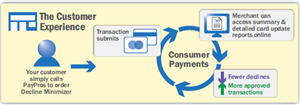The Real Cost Of Declined Recurring Transactions For Businesses
By PayPros
Operations processing repeat or recurring transactions are familiar with declined card headaches. When scheduled transactions don’t occur due to outdated card information, it means lost and delayed revenues, staff time tracking down customers, and inflated processing fees.
 The Survey
The Survey
Recently, PayPros surveyed 230 businesses that process recurring and repeat transactions. 152 submitted more than 100 card-on-file transactions monthly (the point businesses struggle with costs related to card declines). The survey, The Real Cost of Declined Recurring Transactions, illuminated the impact of regular payments declining due to outdated or expired card information. We explored how operations respond to, and attempt to overcome, this all-too-common problem. We learned that, at a granular level, declined transaction costs can be quantified quite accurately.
Results
When asked to consider costs and tasks associated with surmounting the problem, businesses provided direct answers and ample details. Information collected paints a vivid picture of what businesses struggle with daily.
Value of Eliminating Declines — When asked how eliminating most declines might impact operations, the top answer was “increased cash flow.” Popular responses also included, “better customer relations,” “reduction in card processing fees,” and “improved productivity.”
Lost & Delayed Payments — Any card decline delays payment — from a day to weeks. A portion is never collected, as the customer or card information cannot be tracked down. The average value of lost and delayed payments for a business is $8,069 monthly. The average merchant never recovers 4.97 transactions monthly, accounting for $612.70 in lost revenues. Tracking Down Declined Cards — The survey uncovered a number of soft costs. When cards decline, staff is redeployed to locate the new information. They send mail or phone customers. Businesses measured the monthly cost for these expenses alone; they spent $271.26.
The Declined Recurring Transaction Solution: PayPros Decline Minimizer
Easily Integrated — PayPros Decline Minimizer is an automated card updating service, designed for effortless integration by developers. After implementing PayPros Managed Payer, developers use our simple API to update truncated card information stored in their applications.
Totally Automated — Leveraging the PayPros Innovo technology platform, customers can expect a completely automated process using PayPros Decline Minimizer. Businesses request the service and PayPros handles the rest. No lengthy approval process and no setup fees. Daily, PayPros Decline Minimizer automatically updates expired and outdated card information stored in our Managed Payer Data Vault. Virtually invisible to merchants, they’ll benefit from fewer card declines and more approvals. Card update data are available via online reporting tools.
Ready to Set Your Software Apart — Given the cost and lost revenue potential among businesses managing recurring payments, PayPros Decline Minimizer represents an opportunity to add card update capabilities to software quickly, with negligible effort. You’ll experience product differentiation because, for customers, the ease of sign-up and savings will make a difference in operations. Adoption of payment solutions will spike, resulting in increased commissions, maintenance and upgrade revenues.
Request the white paper, “The Real Cost of Declined Recurring Transactions.” Visit https://www.paypros.com/BSM-DMpaper.
For detailed information, call (800) 774-6462 ext. 6632 or visit https://www.paypros.com/BSM-DM.
 PayPros
PayPros
8200 Central Ave.
Newark, CA 94560
(800) 774-6462
